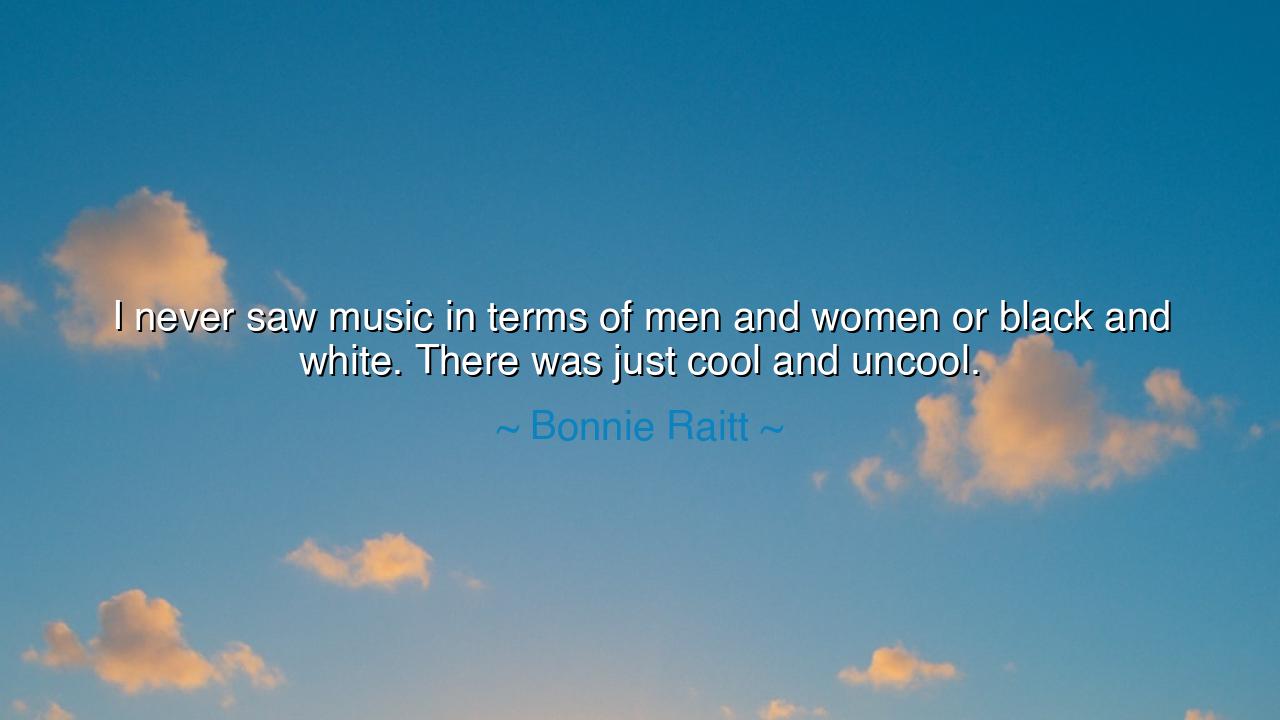
I never saw music in terms of men and women or black and white.
I never saw music in terms of men and women or black and white. There was just cool and uncool.






In a world often divided by superficial categories and differences, the words of Bonnie Raitt offer a vision of clarity and unity: "I never saw music in terms of men and women or black and white. There was just cool and uncool." This profound statement transcends the boundaries that often define us—race, gender, and background—and reveals a deeper, more universal truth: that in matters of art, creativity, and expression, what truly matters is not our differences, but our shared humanity and the essence of what is authentic and genuine. Raitt’s words reflect the belief that true beauty in music, and in life, lies in the quality and depth of expression, not in the labels imposed upon it.
The ancients understood the power of art to bridge divides. In ancient Greece, music was seen as a divine gift, transcending all human categories. The philosopher Plato believed that music had the power to shape the soul, bringing harmony to the individual and the state alike. Aristotle also wrote about the moral impact of music, claiming that it could cultivate virtues such as courage, temperance, and wisdom. In the ancient world, music was not about the identity of the musician, but about the effect it had on the listener’s heart and mind. Music, like other forms of art, was seen as a universal language, able to speak to the depths of the human experience, regardless of race or gender.
Similarly, the Renaissance artists and musicians, like Leonardo da Vinci and Johann Sebastian Bach, broke free from the constraints of their time. They were not concerned with whether their works fit neatly into the categories of the day, but instead focused on the pursuit of excellence, on expressing the sublime through their craft. Bach, in particular, is known for his ability to create music that transcended the constraints of his era, appealing to all who could appreciate its depth and beauty. His works spoke not to the outward identities of the performers or the audience, but to the inner harmony of the soul, as music always has the power to do.
In more recent history, Louis Armstrong, a towering figure in jazz, lived out the essence of Raitt’s quote. Despite being a black musician in a deeply segregated America, Armstrong transcended racial boundaries with his virtuosity and expressiveness. His music was not defined by the color of his skin, but by the power and soul he infused into every note. His ability to unite people through the joy of jazz and his unparalleled skill on the trumpet broke through the barriers of race and class. Armstrong, like Raitt, understood that in the world of music, what truly mattered was not the external divisions, but the connection and emotion that the music evoked in the listener.
The lesson in Raitt’s words is clear: in the arts, as in life, we must seek the truth and authenticity that lie beyond the labels we impose. When we see the world through the lens of divisions—be it race, gender, or any other external characteristic—we miss the deeper, more profound connections that make us human. True artistry is not bound by these differences. Instead, it is rooted in the ability to convey emotion, truth, and meaning through the medium of expression. Whether in music, painting, or any other form of creativity, the true measure of greatness is not in fitting into preconceived categories, but in the power of the work to resonate with others, to speak to the heart and soul without regard for who is creating or receiving it.
In our own lives, let us follow Raitt’s example and embrace the idea that authenticity is more important than fitting in. Just as music can unite us all, so too can our shared experiences, our shared struggles, and our shared humanity. Let us not allow the labels and differences that often divide us to blind us to the beauty of what unites us. Whether in art, relationships, or daily interactions, the goal should not be to conform to external expectations, but to express genuine creativity, sincerity, and connection with others.
The true power of art, and of life, lies in this universal truth: coolness is not defined by labels but by authenticity and the ability to touch the human soul. As we navigate the world, let us keep Raitt’s wisdom close to our hearts—seeking not to divide, but to unite; not to judge based on superficial labels, but to recognize the deep soul of each individual, each work of art, and each meaningful connection. By doing so, we will truly understand that coolness lies not in conformity, but in the courage to express our truest selves, unencumbered by the walls of division.






AAdministratorAdministrator
Welcome, honored guests. Please leave a comment, we will respond soon